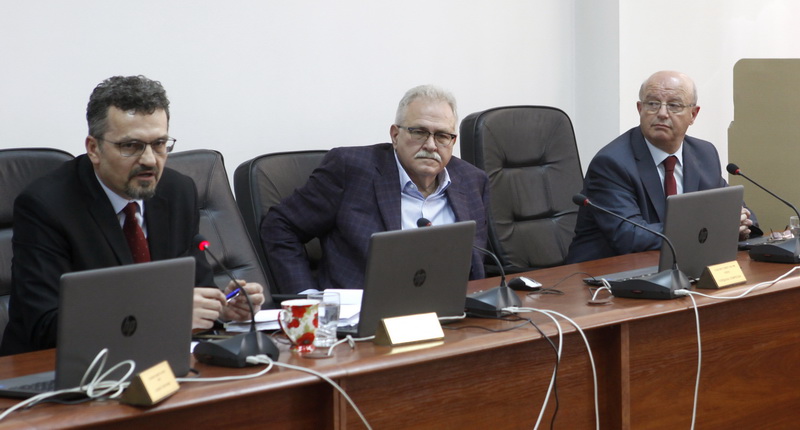Justice Minister claims: No one protects Jovo Vangelovski

The last subjects on the agenda of today’s session of the Judicial Council are the discussion of the reports of the committees for determining the responsibility of judges and making decisions on the submitted requests for determining responsibility. However, up to the beginning of today’s session, there was no information whether the President of the Supreme Court, Jovo Vangelovski, will be finally a topic at the session, for whom there is an open procedure and his responsibility cannot be determined for years. After the sharp criticism of Interior Minister Oliver Spasovski, who said that the police need to start arresting judges and prosecutors, just as they arrest state officials, Justice Minister Renata Deskoska sent a message to the judicial institutions, which said that the Ministry of Justice has completed its duties, and the effects of these duties need to be delivered by judges and prosecutors.
“All the laws that we have adopted in the past period create very precise and clear bases for establishing responsibility for all who will be violators of the law, so it is certainly the responsibility of the Ministry of Justice to propose a quality legal framework and the responsibility of the public prosecution and the judiciary is to implement it. I expect everyone to be aware of their responsibility and allow for the effective implementation of the legal provisions that we have, we have clear provisions for the dismissal of judges, and I expect that the Judicial Council will act under the new Law on Judicial Council and the Law on Courts,” Deskoska said.
Although the procedure for determining the responsibility of the president of the highest court is dragged on and never seems to get on the agenda, the minister claims that no one protects Jovo Vangelovski.
“If you are referring to the executive power, I do not think there is anyone that would protect him (Supreme Court President Jovo Vangelovski). The Judicial Council is conducting a procedure for his dismissal. I expect that, therefore I send this message, and the Judicial Council will be aware of its role. We can make the reform by proposing European laws that are praised by everyone, but implementation is up to the bodies for which we are adopting those laws. The Judicial Council has no reason to flee from law enforcement, and now it has no right, with everything that has been signed as clear and precise bases by introducing the principle of responsibility and the Council itself,” Deskoska said.
During his entire mandate, previous president Zoran Karadzovski did not put the item for determining Vangelovski’s responsibility and the responsibility of other four judges who had decided to release Sead Kochan from detention on the agenda.
The new president Kiro Zdravev, when he was elected he promised to re-examine the responsibility of the former president and all judges for whom proceedings have been brought before the Judicial Council.
No investigation of the ACCMIS scandal in the past two years
Vangelovski, along with the former president of the Criminal Court, Vladimir Pancevski were summoned as witnesses for the manual distribution of cases in the Criminal and Supreme Court. The case-handling scandal was opened almost in the same period when the procedures for determining the responsibility of judges were opened. For two years now, the scandal with the ACCMIS system is in preliminary investigation, Vangelovski and Pancevski were summoned for a hearing, but both of them are still not considered suspects because the prosecutor’s office has not yet started an investigation. Prior to the publication of the country’s progress report, at the request of the European Commission, the prosecutor’s office sent everything it has done in the proceedings for ACCMIS to the Ministry of Justice.
“Don’t expect miracles overnight, no investigation and court proceedings have ended quickly. However, this is in a tolerable time frame, in accordance with the procedures that are prescribed and which exist, but I expect there will be new moments,” Deskoska said.
The report was declassified and it revealed that 860 cases were not entered into the ACCMIS system and no judges were assigned for any of these cases.
Specific cases were handed from one judge to another judge, and frequent changes in the annual schedule meant a limit to which judge would be included in the automatic allocation. Judges were removed from the ACCMIS system on various grounds with just a short signature by the president of the court.
Now, the annual monitoring of the functionality of the ACCMIS system has shown that cases are no longer being personally handed. A regular monitoring of the functionality of the ACCMIS system has been introduced by the Commission, consisting of judges, IT experts, administration and foreign experts.
A new law on the management of the allocation of cases in courts is under way, which reinforces the mechanisms for automatic allocation of objects.
According to Deskoska, the new law requires prevention and protection against the possibility of withdrawal and filing procedures by the same lawyer in order to target a particular judge to be distributed through the ACCMIS system.
Diana Paletin, a political officer at the US embassy, says the European Commission in the latest report states that the Justice Ministry must ensure the full and independent functionality of the ACCMIS system.
According to her, adopting and changing laws is often considered the easier part of the job and the implementation of these laws remains the main challenge.
Frosina Fakova – Serafinovic